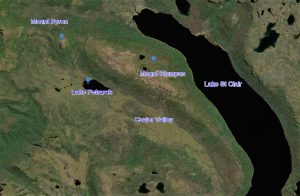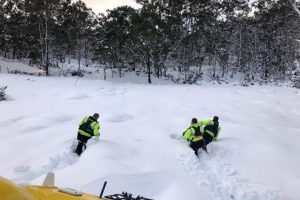In July 2019 bad weather battered the same high country that had claimed Yates 110 years before. It brought thick snow and freezing conditions. Walkers were caught out. Two experienced bushwalkers in the Walls of Jerusalem National Park set off their EPIRBs (Emergency Position Indicating Radio Beacon). Helicopter and ground rescue parties were hampered by impossible weather. On the Overland Track, two walkers struggled through snow to Pelion Hut. Police rescued an experienced walker near Lake St Clair in response to an activated EPRIB.

Before the bad weather had struck, a lone bushwalker had set out from the Lake St Clair visitors’ centre. He planned a 10-day walk in the Cuvier Valley area.1 He was scheduled to return on Saturday 13 July 2019.
The hiker did not return. Given the conditions, the police were concerned but optimistic. They immediately asked for ‘information from members of the public to help them in their search’. The walker was described as experienced. The police understood that he carried an EPIRB (Emergency Position Indicating Radio Beacon), which had not been activated.
The police started the search on Monday 15 July, but it did not begin well.
The Westpac Rescue Helicopter was forced to turn back from the search … late on Monday morning due to dangerous conditions. Police said further attempts would be made once conditions improve. This is rugged terrain with no formal track. The search is being further hampered by the current weather event, with no mobile communication in the area.
Land crews have been assigned from Narcissus Hut to Cuvier area and surrounds and also from the Visitors Centre to Narcissus.
However, ‘Tasmania Police said it remains optimistic a missing hiker … would be found alive and well despite dangerous weather conditions hampering search efforts.’
The police were clearly relying on the walker being well prepared and that he had not activated his EPIRB. ‘The last information that his family had was that he was at a sheltered campsite.’
Again the need to help drew people to help. In this case, ‘Police would like to thank those people who have volunteered to join the search, however the conditions are not suitable for unskilled volunteers.’2

By Tuesday afternoon the walker had been found. He had been overdue for just three days.
Police spotted Melbourne man … from the rescue helicopter shortly before 4:00pm on Tuesday. He was flown to Hobart where he gave the thumbs-up to waiting media. … He will stay overnight in the Royal Hobart Hospital, where medical staff say he is in a stable condition and not suffering hypothermia.
However, it soon became clear that he had only just survived. Unlike Yates, he had been well prepared but he had got into trouble well before the alarm was raised. The police reported that he had been;
found in an area with rugged terrain and chest-deep snow. Without the experience that he’s had in alpine environments in Victoria and on other wilderness trips in Tasmania, it’s likely that we’d have a very different outcome. It’s the best result and we’ll all sleep a lot better tonight knowing that (the walker) is tucked up safely in his bed.
Police had been unable to search the Mt Cuvier area until Tuesday due to weather conditions. His rescue has been one of several in the Cradle Mountain-Lake St Clair National Park in the past 48 hours.3
It wasn’t until the hiker had rested that he could tell the whole story. His survival was largely due to his excellent preparation and experience. And a dash of good luck. With the first few days of his planned 10 day walk, the hiker had lost his pack with most of his supplies and importantly his EPIRB, after he had put it down to look for a tripod. He had looked for this pack for three hours in the dark before going back to his tent.
The hiker;
then returned to his tent to stay dry, but soon became snowed-in. “A couple of times I would wake up and my tent was sitting on my head from the snow,” he said. “On Thursday and Friday it changed to dry, sort of powdery snow, and that’s when you just got blasted, so for three days I was just trying to keep the tent out of the snow.
he was kept warm by his sleeping bag, which he managed to keep dry until rain started on Sunday. “It just got worse and worse and worse, and by Sunday night I couldn’t get out the sides,” he said. “Water started getting into the bottom of the tent, so I was scraping out water a lot of the time, and by then I had to cut a hole in the top of the tent to get out. I couldn’t have gotten out otherwise.” He used two orange garbage bags to keep himself dry enough to survive, and some strong will. “I wasn’t going to give up. If I die in the tent, I’ll die in the tent, at least they’ll find the body,” he said.
Inside the tent, he said, ‘I had no radio, had no means of telling the time, so it was essentially nine days in there — just day and night. There was no sun in that time so you don’t know how long the days are.’
When a helicopter came, he;
saw them, probably 200 metres away, I could make out the helicopter but I couldn’t hear it until the last minute because the wind was blowing the other way, I saw it on the edge of the shelf and then it’s gone,” he said. “I thought I’d probably lost my chance because you just don’t know with this type of weather, it can last days.” “I’d only eaten freeze-dried food for a week, hadn’t been to the toilet for a week, I was definitely too weak to make it out by myself.”
Then four hours later, the helicopter returned. “I was just standing there with my orange garbage bags just waving them around like a windmill, just jumping up and down, then [the rescue crews] turned around and came back towards me.” “It was the happiest day of my life because as I said, I probably wouldn’t have lasted too much more than another night.”
Police said … it was ‘pure luck’ the crew got a patch of clear weather. “It is an absolute credit to him and his preparation and his ability to cope over the last few days to keep himself healthy and warm until we could get in’
The hiker ‘thanked emergency workers, saying the physical exertion and danger they put themselves in to find him was “unbelievable”.
What do these stories tell us?
For walkers there is much to learn from the good and bad decisions in these stories. The disappearance of Edward Yates is a proper mystery. There were no strong clues about what happened to him. We can draw some parallels from the disappearance of Thomas James Connolly at Lake Windermere in 1901 (see our Mountain Stories blogs from 2019). In his case his body was found and the tragic tale could be pieced together.
Yates, like Connolly, knew the country. But they both decided to make a short walk, nothing more than an hour or so. They did this without much more than what they had in their pockets. When the weather came in the cloud obscured the few landmarks that would guide then. They drifted from their course and continued on rather than turn back. Snow sealed their fates.
The bushwalker in 2019 travelling alone but with plenty of gear and supplies. And importantly an EPIRB. He travelled on a day walk from his base camp carrying key equipment. The single error was to leave his backpack, for just a brief time. His link to the outside world was broken. He returned to his base camp and waited for the searchers that would inevitably come. The only question would it be soon enough.
Human nature says that there will always be a search and that search will never be completely abandoned until a lost walker is found. We expect that. The urge to help is almost universal. Even when we are just reading about a lost walker, there is a fascination with their circumstances and a hope carried in every person that they will be brought to safety.
Searches were quickly launched for Yates, and Connolly. Police and the local community poured into the country and stayed out for days and weeks. They didn’t give up until every small piece of hope was gone. Hundreds of people searched and family joined in.
In 2019, volunteers were turned away from the search. The conditions were appalling. Too difficult for even the helicopters which are the work horse of search and rescue in the remote country. The capability of these machines is so far beyond the ground searches of the past. Night and day flying, spotlights and thermal vision can be used to cover a lot of country and quickly locate missing people.
If you go into bush today do the right thing. Make sure that you have the right equipment, plenty of experience, know your limits, leave details of your trip plan and your return date. Make good decisions and know when to activate your EPIRB. If the worst comes to the worst you know that there will always be a search.
Ian Hayes & Peter Brown copyright 2021
1 We have not identified the walker although his name is part of the public record. We don’t intend to bring any further discomfort to him due to his bad luck. His is an example of the difficulties of being in the Tasmanian highlands in the current times. The rescuers were full of praise for his experience and will power.
2 The Advocate
3 ABC News online